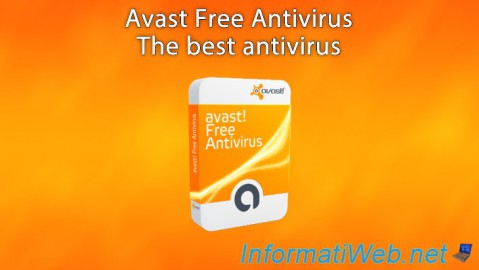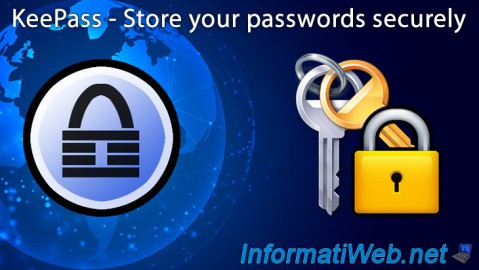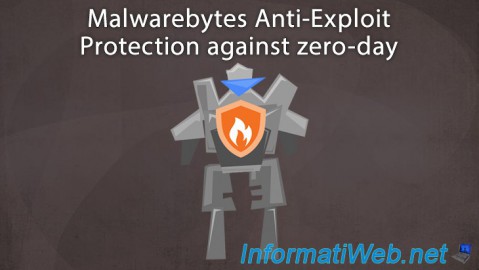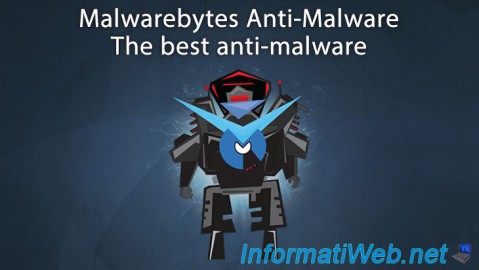Protect yourself against viruses, hackers and traps present on Internet
- Security
- Avast, KeePass, MBAE, MBAM, USB Vaccine
- 12 March 2016 at 14:09 UTC
-

- 3/5
9. Keep your antivirus, your anti-malware and your antispyware up to date
Update your antivirus, anti-malware, ... is very important to protect themselves against new threats that appear every day.
Luckily for you, these updates are automatic and you should never turn them off. Even if a hacker ask to it.
Moreover, never install a cracked version of an antivirus or another. It's prohibited and your computer will be more vulnerable to viruses. Indeed, the hacker has probably altered the behavior of the program to show that the antivirus is active while it is not.
Purchasing a license on eBay or another is a very bad idea, because it's prohibited (the resale of license is not allowed, except by dealers authorized by the editor) and you probably will receive a license stolen (if you get one).
In short, cracked protections are prohibited. They only bring you problems.
To return to the updates of these protections, there are generally two types of updates for these programs :
- Updates of the virus database
- Updates of the program
9.1. Updates of the virus database
These updates are always performed in the background, and are performed every day or every x hours. It depends of your antivirus and other protections.
In summary, the virus database is a list of signatures that detect all known threats. Thus, the antivirus is able to detect viruses on your computer if the virus is already known. This is why the antivirus have always a slight delay compared to new threats from hackers.
9.2. Updates of the program
The program updates (antivirus, anti-malware, ...) is much less common than updates of virus database.
Indeed, the update of an antivirus, an anti-malware, ... mainly allows to :
- improve the program detections methods (behavioral analysis, ...)
- fix bugs or conflicts encountered with other programs
- add new protections : protections for online payments, protection against phishing (fake websites created by hackers that looks like the real site), ...
- improve the program performance or compatibility with new operating systems
When an antivirus must be updated, it will warn you and will install it automatically. If it does not, just install the latest version of the program without uninstalling the old first. (Except if the publisher asks it)
10. Make regular antivirus and anti-malware scans
We can not say it enough : install an antivirus, anti-malware or an antispyware is good, but also make regular scans with these programs is better.
All antivirus, anti-malware, ... are different, but in general, antivirus and other manufacturers, still displays an "Analysis" or "Scan" option.
So, just click on it and follow what it says on the screen if necessary.
11. Use a secure and reliable passwords manager
Who has never written 1234 or "azerty" or "qwerty" as a password because they are simple to remember? Indeed, they are easy to remember, but also easy to find for hackers (or everyone).
Another bad idea used by many users is to create a good password, but using it everywhere, in general, the same credentials (username, email, password).
The problem is that when a site is hacked (even gmail and Amazon are not spared), hackers can have fun to test these credentials on various known sites. Including social networks, email providers, ... In short, when the hacker have access to your e-mail address, he can access to all sites where you are registered, by using the "lost password" feature present on all sites.
Same for questions and secret answers. Most users will choose one question among those proposed and put the right answer as secret answer. So, the answer is not secret because it becomes evident to the people that know you. (Same for password information that can be put for a Windows session)
Metaphor : assume you hide the key of your home in a place where no one will find it (secure password) and you paste a message "the key is in this place" on the door of your house (too accurate indication ). So, the person would have access to your home while she did not know where the key was hidden well.
In short, you always need to :
- use secure passwords : combination of letters, numbers, and special characters. Use upper and lower case. And passwords of a minimum length of 8 characters.
- use different passwords on each site: if an account or a site is hacked, your other accounts will not be in danger.
- do not put the real answers to secret questions, otherwise the secure password will be useless. It would be a security breach.
So, you tell me : That's all well and good, but how can I do to remember all my passwords, me ? Well it's simple, just use a secure password manager like KeePass.
In summary, KeePass lets you create an encrypted file with all your passwords and secret questions / answers (through notes).
So, you only have one password to remember. The password that will enable you to decrypt the file.
KeePass is a free program, open-source and cross-platform (Windows, Linux, Mac ...). Also, this encrypted file can be used securely on smartphones, tablets, and other mobile phones.
For more information about this program, please see our full article : KeePass - Store your passwords securely
12. Encrypt sensitive data
As we are talking about security of your computer, also talking about the security of your personal data.
Some of you may keep sensitive data on their computer, such as : invoices, copies of official documents, or even perhaps source codes of programs that you sell on Internet.
Whatever the type of data you want to protect, know that it is possible to encrypt your data securely with a free open-source program called "TrueCrypt".
Data encrypted with this program can not be decrypted without the decryption key. AES encryption is used and is also used by US federal agencies.
For more information about this program, please see our full article : TrueCrypt - Encrypt your data securely to prevent theft of confidential data
13. Never downloading cr@cks on Internet
Hacking and cracks are sensitive topics, but known to all. Especially when it's a free download of a paid program.
On the user side, this allows them to download paid programs including best known programs and latest games.
Some of you will probably recognize themselves in this big part of users who thinks only to find the last pay programs and games on dangerous sites.
Be a little smarter, and think 2 seconds (or more) to understand why these cracks are offered for free on Internet.
Here is a little funny video that Adobe had created to advertise for Adobe Creative Cloud.
The video is funny to watch, but what the guy says in this video is totally true.
Note : Listen to what he says when he explains why Photoshop is slow. And he explains that the crack has also installed a botnet client. (This is also the case for hacking sites, including the one that had attacked us directly without doing too much damage)
Now, on the hackers side, piracy is primarily a challenge, but also a way to earn a lot of money.
Indeed, becoming a hacker is not done in two days, and as you can see in the news, they "have fun" to foil new protections created by companies specializing in this domain.
Once the flaw found, they adds a virus in the modified file and distribute it for free.
Note that a virus can be added to any file (executable or not).
For the virus, it can do many things :
- spy you at large sense
- spy what you type on the keyboard (to steal your account numbers, passwords, ...)
- open a door on your computer to send viruses on your computer or other things
- create a vulnerability on your computer to use it in the future
- allow the attacker to take the complete control of your computer
- spread a virus on your network or to other computers with USB keys and external hard drives
- etc. There is no limit to what can do a virus
All stolen information is then retrieved by the hacker and sold to other hackers or unscrupulous companies.
I would not enter no more into detail to avoid exceeding the red line in this area, but here is a summary of the danger to which you rub when you want to get everything for free.
14. Scan everything you download with several antivirus
A common question is : what is the best antivirus? In general, we will reply :
- it's you. We have to demonstrate logic and not fall into traps present on Internet
- or : there is no one who is better than the other. Each has its strengths and weaknesses.
As you should never install multiple antivirus at the same time on the same computer, it's impossible to scan a file on your computer with several antivirus.
But, online, you can do it. Probably because there is a whole infrastructure behind with one antivirus and/or antimalware per server or through application virtualisation, ...
In short, thanks to Virustotal, virscan and other online sites, it's now possible to scan a file with 55 antivirus, anti-malware, and/or anti-spyware.
This site does not replace your antivirus because it can not scan your computer directly. It scans only files that you send.
Moreover, sent files are scanned by different antivirirus and other in command line. Files are scanned by the antivirus only through their own signature databases.
While a traditional antivirus may detect other types of viruses through their heuristic methods (behavioral analysis of a program). What doesn't do this site.
Note that Virustotal is a reliable site because it was created by an independent laboratory and was bought by Google in September 2012.
Official post on the VirusTotal site : An update from VirusTotal
Share this tutorial
To see also
-

Security 2/19/2016
Avast Free Antivirus - The best antivirus
-

Security 5/5/2014
KeePass - Store your passwords securely
-

Security 3/6/2016
Malwarebytes Anti-Exploit - Protection against zero-day
-

Security 2/29/2016
Malwarebytes Anti-Malware - The best anti-malware
No comment